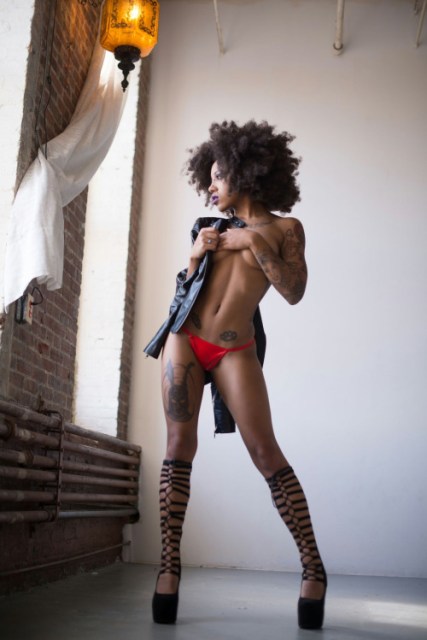Feature image via plusmodelmagazine.tumblr.com.
Welcome to NSFW Lesbosexy Sunday!

via drawnwithcurves
+ An LGBT-inclusive sex ed curriculum is so easy and so possible which makes it so stupid that it barely exists anywhere:
“An LGBT inclusive sex education would mention that there are a variety of families, including same-sex parents parents, and challenges to gender roles would be helpful to including nonbinary, agender and transgender people. Teachers can talk about consent and STI prevention in a way that doesn’t just focus on heterosexual relationships or penetration and cover pregnancy prevention in a way that doesn’t exclude transgender people.”
+ At the Hairpin, Lindsay King-Miller writes about healing from sexual assault in an intimate relationship, couple-dating, coming out and what to tell your younger queer self:
“Be aware that there’s lots of sex in the world, and you don’t need to get horizontal with anyone you feel lukewarm about just because you’re afraid you might not get a better offer. You’ll get lots of better offers. One of the greatest nights of my life was when I had the shining epiphany: I wish I were at home masturbating, and then made that dream a reality. It may sound obvious, but that realization changed my whole approach to sex and dating. Never put yourself through a sexual encounter that’s not as much fun as what you can manage by yourself.”
+ At Oh Joy Sex Toy, Erika Moen reviewed my favorite introductory lesbian/queer/”girl on girl” sex guide, Girl Sex 101, and writes, “this isn’t like any other sex ed book I’ve read before.”
+ Being comfortably full has been linked to being “more responsive to romantic cues.”

via boyish percent
+ Here is everything you always wanted to know about getting rid of pubic hair if getting rid of pubic hair is a thing you’re into.
+ Read this: Amnesty International’s Policy Calling for Decriminalization of Sex Work is a Move in the Right Direction.

Alex LaRosa via prettyplussize
+ Xan West on what it’s like to write erotica as a disabled top:
“I care about … writing characters (tops and bottoms) who are disabled. Not just because it’s missing from erotica (which it is), or because it’s reflective of reality (which it is). But also because it’s part of my own process of shifting my internal framework for thinking about kink. I have internalized ableist frameworks that shape how I write and how I think about kink. I need to be attentive to the ways they infuse my erotica, just as I need to be attentive to the ways they infuse my life.”

via womenofcolor
+ Healthy relationships share certain traits, including communication, trust, love, respect and more:
“The most intimate moments of a relationship are not the domain of any one type of relationship. They matter in all relationships, and they make the difference between a successful relationship and one that’s bound to fail. Bondage, whips, chains, kneeling, control – all of those things may separate the kinky couple from the vanilla couple. However, a good relationship is built between people who can communicate with one another, learn to trust each other, show love and respect, and never forget the importance of small intimate gestures. No matter what flavor you prefer for your sex, all good relationships have these things in common.”

Kia Rayford by Henry Riggs
+ Orgasms don’t have to be that complicated, honestly:
“Orgasm is the rhythmic release of the pelvic muscle tension created during arousal, and it is caused by sufficient stimulation of the penis or the clitoral glans/vulva area. It’s the same for all sexes, all genders, trans people, gay people, straight people, intersex people, you name it, if they got something that is like a penis or a clitoral glans, it can be stimulated to orgasm. Males generally trigger ejaculation at orgasm, but orgasms and ejaculation are two different things and can be experienced separately.”
(Obviously not everyone is capable of orgasm for various reasons but this plays into the writer’s larger point, “let’s stop being bewildered by orgasms for people with vaginas.”)

via
+ From The Autostraddle Lesbian Sex Archives: “Mira Bellwether and “Fucking Trans Women” Zine: The Autostraddle Interview“:
“I wanted to stress the biological facts of our bodies. We have to build a very basic vocabulary and common understanding in terms like, ‘this spot has lots of nerves running through it. This part likes pressure, this part likes stroking, this other part can do X, Y, and Z.’ If you keep sex at the conceptual level, I think you find that it’s not as rewarding as you want it to be. In order to have good sex, I think we have to acknowledge our bodies, come to terms with them as they are, and be able to inhabit them. In other words, to be immanent rather than transcendent.”

via Heather Hazzan
All of the photographs on NSFW Sundays are taken from various tumblrs and do not belong to us. All are linked and credited to the best of our abilities in hopes of attracting more traffic to the tumblrs and photographers who have blessed us with this imagery. The inclusion of a photograph here should not be interpreted as an assertion of the model’s gender identity or sexual orientation. If there is a photo included here that belongs to you and you want it removed, please email bren [at] autostraddle dot com and it will be removed promptly, no questions asked.





Writing Erotica as a Disabled Top feels like an important read. It’s small, a little seed of writing. Erotic works influence real life erotic acts, fantasies, realities and internal frameworks. Most of us are aware how media influences, I think, and it’s like a reminder that a person with their own self created that, but they themself were influenced by existing framework and are working in or struggling with it.
I’m debatably disabled myself, top and have experienced trauma that makes some things hard limits on my end. There is always talk and valid concern with vulnerabilities on the sub side of things, but little on the top side.
Logically we know everyone has the right to limits, the right to NO, safeword, to refuse or quit, but somehow mistake that only the one getting somethinged is the only one who will ever need to any of those.
Anybody doing anything with another body has the right to those and it’s important to remember this applies to all.
ALL.
This is a really interesting topic, how the frameworks effect us, our inner stories and desires.
I just want to thank you for this line:
I didn’t have an orgasm until I was 24 and up until then I felt so much shame about it.
This was great, as usual
Thanks!
You always have the most beautiful pictures on these articles. I was having a really bad body image day and I feel much better after seeing today’s ladies. Thank you!
That makes me feel happy to hear and I’m really really glad!!
I’ve been contemplating sugaring as a method of bikini hair removal, but I’m just nervous about it. Has anyone here done it? do/don’t recommend?
NSFW Sunday has had a real, tangible effect on my body image in an incredibly positive way. I think it is also the constant exposure to these pictures in this weekly post, and the fact that it is not tokenizing, where I would always have the “really” attractive pictures to show the difference to the one body positive. Thank you SO MUCH.
“Immanent rather than transcendent.” Perfectly put, and incredibly helpful.
loved the writing erotica as a disabled top piece, thanks for including it!
Am I the only one who was cringing all the way through the pubic hair article? All of those methods sound INCREDIBLY PAINFUL, and the idea of using Nair down there sounds terrifying! I think I’ll just stick to trimming it up with my electric razor.
Probably not.
I didn’t even try to read it
I’ve read the details of and watched a labiaplasty surgery, I legit do not need anymore vulva horror.
I have a lot of mixed feels about the orgasm article. Here’s what I posted in a sex educator’s union group I’m a part of—
Read it over and fully through and I think there’s actually good scientific critique in there though it says some bullshit too. Overall, yes, it makes good points about what scientific data is available and how science/media/etc. make female orgasm seem like the most mystifying thing ever, and it critiques some of the available research for how the media treats it and effectively avoids discussing the specifics of them, BUTTT there’s stuff that concerned me, like:
“An erection means a man is aroused” = Um, what? This flies in the face of what many of us would say, and I’m wondering if it’s because the person is using a physiological description of arousal that is divorced from mental processes…? Like “a state of responsiveness to sensory stimulation or excitability” or “physiological activation in response to a situation leading to alertness and readiness to respond”? That seems like the only reasonable explanation.
“These are just things people talk about. There is no scientific proof that they exist. An orgasm caused this way has never been observed or recorded in science, not even in the scientific research the BBC article references. In the same way, for men, spiritual orgasms, orgasms from anal sex, prostate stimulated orgasms, and mental orgasms are just things people talk about. They are not actual orgasms men can experience.” = I’m not familiar enough w/ the literature to have a super strong opinion on that piece, and I do encourage all of us to be critical of the studies we DO cite and see because many of us aren’t trained in statistics and research methodology so we fast-track to the conclusions instead of questioning the process and if the study can actually be generalized in any meaningful way. Aaaaanyway. A problem I have with this section is that it sounds so harsh and negative and like “NO THOSE ORGASMS YOU SAY YOU HAD ARE NOT REAL” buttttt I think why that’s happening is because of how this person is zeroing in on orgasm as that release of muscle tension and rhythmic contractions. If anything, props to her for being clear and consistent about her language. She’s not denying the pleasure; just saying they don’t fit that medical definition of orgasm [but I think that’s where she fails esp. in the beginning of the article: she doesn’t make that clear enough]
To me, while I appreciate some of what this is doing, feel that it’s a completely different framing than most of us who are sex educators or sex therapists here have. A lot of our focus is on pleasure and finding ways that people can find pleasure from multiple sources, and some or many of us specifically work against the idea of measuring sex by orgasms achieved. Statements like in the paragraph above strike us as super fucked up because they focus so much on the science and less on the subjective experiences of people and the value they place on them. The focus on scientific proof to validate people’s experiences feels shitty, and for those folks here who are actively trying to expand the very definition of orgasm beyond the rhythmic contractions/muscle tension release model, it feels like a step back. Is that an accurate summation of people’s reactions to the article?
Also, this explains her line of thinking further and why she’s making these hard distinctions over what is an orgasm and what isn’t: http://www.sciencesexandtheladies.blogspot.com/2012/10/yeah-you-heard-me-vaginal-stimulation.html